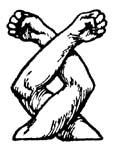
Saying “No” to Death in All Its Manifestations
A SPIRITUALITY OF PEACEMAKING — PART II
When the Second World War came to an end, I was only 13 years old. Although my parents had skillfully protected me and my brother from the horror of the Nazis in my native Holland, they couldn’t prevent me from seeing how our Jewish neighbors were led away, and from hearing about concentration camps to which they were deported and from which they never returned. Only in the years after the war did I become aware of the demonic dimensions of the Jewish persecution and learn the word “holocaust.” And now, 40 years later, I often ask myself: “Why was there not a massive popular uprising? Why weren’t there marches of thousands of people protesting the genocide that was taking place? Why did the millions of religious people not invade the camps and tear down the gas chambers and ovens that were being built to annihilate the Jewish people? Why did those who pray, sing hymns, and go to church not resist the powers of evil so visible in their own land?”
It is important to find answers for these questions. But today I am no longer a 13-year-old boy who does not fully understand what is going on. Today I am an adult living only a few miles from the place where the Trident submarine is being built, a weapon able to destroy in one second more people than were gassed in Nazi Germany during the long years of the Hitler regime. Today I am a well-informed person fully aware of the genocide in Guatemala and the murderous terror in El Salvador. Today I am a well-educated teacher who is able to show clearly and convincingly that the costly arms race between the superpowers means starvation for millions of people all over the globe. Today I am a Christian who has heard the words of Christ many times and knows that the God of Israel and of Jesus Christ is the God of the living in whom there is no shadow of death.
Today I am asking myself the question: “Does my prayer, my communion with the God of life become visible in acts of resistance against the power of death surrounding me?” Or will those who are 13 years old today raise the same question about me 40 years from now that I am raising about the adult Christians of my youth? I have to realize that my silence or apathy may make it impossible for anyone to raise any questions 40 years from today. Because what is being prepared is not a holocaust to extinguish a whole people, but a holocaust that puts an end to humanity itself — that will not only make giving answers but also raising questions a total impossibility.
These thoughts are constantly on my mind. These concerns keep me wondering about how to be a peacemaker today and every day of my life. I will never be able to say: “I didn’t know what was going on.” I do know with frightening accuracy what will happen when nothing is done. Being a peacemaker today requires that my prayer become visible in concrete actions.
You May Also Enjoy
Here we present samples of offerings in the Narthex, the NOR’s online blog.
U.S. media and the American judicial system will gladly go after a high-ranking Catholic priest or bishop but will run cover for powerful Hollywood directors and actors.
Old couples in Japan, with no one to depend on, live in makeshift houses offered by the government. They are victims of the contraception-abortion mentality.

